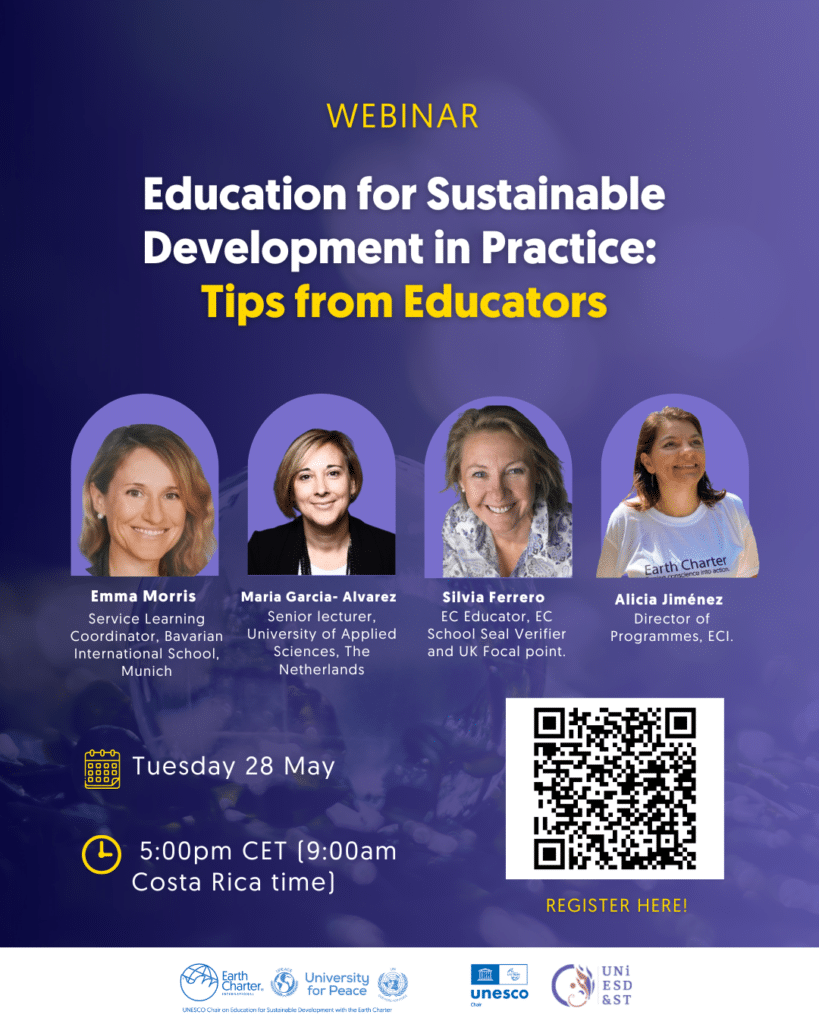Date and time: Tuesday 28 May, 5:00pm CET (9:00am Costa Rica time)

This webinar will bring together three educators from different education contexts to share good practices on education for sustainable development. In this case, a secondary school teacher from Germany, a University professor from the Netherlands and an educator from UK and Italy working with community groups and also schools, will share how they’ve embraced the challenge of infusing sustainability into their classrooms or education activities, what is working and also what is not working in the quest to bring sustainability into education settings.
Getting acquainted with other people’s experiences proves to be a very effective way to learn and internalize the learning. Many educators feel they don’t have the knowledge or skills needed to bring sustainability into their classrooms. By listening to other educators’ experiences, they may find easier to translate the theory into practice, and hopefully feel inspired to act.
The speakers have one thing in common: they have completed the Online Certificate on ESD that the Earth Charter Center for ESD and the University for Peace offers every year. In this sense, they’ll be able to share with us how they’ve been able to put their own learning into action.
This webinar is organized as part of our UNESCO Chair on Education for Sustainable Development with the Earth Charter, which develops education programmes and research in the field of education, sustainability, as well as values and ethics. And the UNITWIN Network on Education for Sustainable Development and Social Transformation.
Speakers:
Emma Morris: (UK, Germany), currently the MYP G9 & 10 Service as Action, CAS and Service Learning Coordinator at Bavarian International School, Munich. Originally trained as a secondary music teacher before diversifing into international experiential learning. She comes with over 20 years of applying the art of community service and sustainability project management within education.
Maria Garcia- Alvarez (Spain) is a Senior lecturer of the Global Project and Change Management BBA program at the Windesheim University of Applied Sciences in the Netherlands. She is a lecturer in Geopolitics & Globalization and Global Challenges, using the Earth Charter to teach on values approach to sustainable development. She is co-developer and coordinator of the educational concept Value Creators, awarded by the Dutch Ministry of Education with the higher award on education innovation. She is an Earth Charter certified ESD Educator and she is involved in other international networks working on Sustainable Development, such is UN SDSN, UN Habitat, Wellbeing Economy Alliance and the IDGs initiative. She is a PhD Candidate at the Faculty of Philosophy, Anthropology and Education at the University of the Basque country, where she carries research on innovative learning environments to foster Education for Sustainable Development. She is also a guest lecturer for the Master of Leadership and Sustainability Aldatuz, faculty of Economics at the university of the Basque Country, where she lecturers on alternative futures for sustainable development. She has authored and co-authored different articles published internationally in the field of ESD. At the moment, she is also Special Editor for Springer Nature series on Discover Sustainability, where she guides an edition highlighting tools and concepts to overcome barriers for a full implementation of ESD in higher education. In the Netherlands, she is member of the Board of Directors of the National Comenius Network, fostering innovation in higher education.
Silvia Ferrero (UK, Italy): Earth Charter Certified Educator for Sustainable Development, Earth Charter School Seal Verifier and UK Focal point. Anthropologist, Managing Director Silvia Latham Consultancy, Coaching and Mentoring on Eco-development. She has a PhD in Social Anthropology. In 2023, co-facilitated courses 3 and 4 in the Earth Charter Online Certificate on ESD. In 2022, was guest speaker at the course Product Design Engineering at the Engineering faculty at Canterbury Christ Church University, Kent, UK. Since then, she introduces Sustainability and the Earth Charter in the course. As a motivational coach, she works with private and corporate clients, secondary and university students. She is committed to using The Earth Charter principles and values as a foundation for her professional consultancy to enhance eco-development and encourage personal growth also through the endorsement of the values expressed in the Earth Charter. As an anthropologist, she worked on a three-year EU funded comparative project on schooling and ICT with five European institutions under the Socrates-Minerva Program.
Moderator: Alicia Jimenez (Costa Rica) is Director of Programmes at the Earth Charter International (ECI) Secretariat in Costa Rica. She is a biologist from the University of Costa Rica, with a MSc in Resource Development from Michigan State University in the United States and a PhD on Education from La Salle University, Costa Rica. Since 1998, she has been working in the field of conservation and sustainable development. She worked in the IUCN Mesoamerica’s Regional Office and the National University of Costa Rica and has been involved as a visiting professor at the University for Peace. In 2006, she joined the ECI, where she oversees the Earth Charter work especially in Latin America, Africa & the Middle East and Asia Pacific. In addition, she is involved with the Secretariat’s projects on education for sustainable development, facilitating courses, workshops and research processes. As part of her doctoral research, Alicia generated the instruments and methodology of the Earth Charter School Seal. She received a fellowship at Leuphana University (Germany) to work in the area of transdisciplinarity and education for sustainable development. She’s currently co-coordinating the ACT4SDGs project, on infusing sustainability in the academic teaching of 10 Universities in Latin America, project funded by the ERASMUS+ Program.






